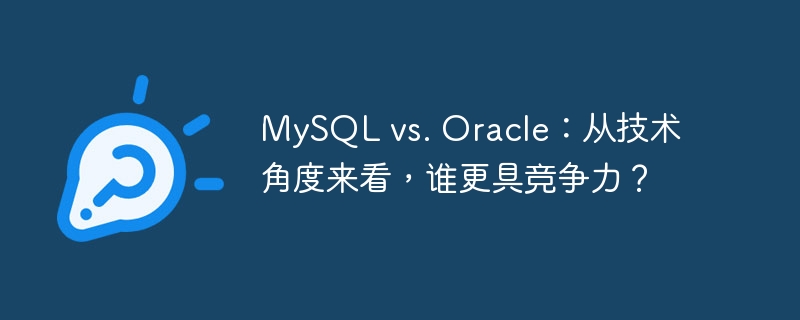

MySQL vs. Oracle: Who is more competitive from a technical perspective?
Introduction:
With the rapid development of the Internet and the advent of the big data era, the choice of database management system (DBMS) has become particularly important. Among many DBMS, MySQL and Oracle are two database management systems that have attracted much attention. Although both have their own advantages and disadvantages, who is more competitive from a technical perspective? This article will compare MySQL and Oracle in terms of performance, scalability, security, and price, and give code examples to illustrate their differences.
1. Performance comparison:
In database systems, performance is the focus of users. MySQL and Oracle have different performances in terms of performance.
MySQL:
MySQL is a lightweight database management system known for its high performance. Its simple architecture and optimized query execution engine make it excellent at handling small and simple database applications. For large-scale databases or complex queries, MySQL's performance may suffer.
The following is a simple MySQL code example:
SELECT * FROM users WHERE age > 30;
Oracle:
In contrast, Oracle is a powerful, complex and comprehensive database management system. Its query optimizer can optimize query operations based on statistics and indexes, making it perform well when handling complex queries and large-scale databases.
The following is a simple Oracle code example:
SELECT * FROM users WHERE age > 30;
From a performance perspective, MySQL is more competitive when handling small and simple database applications, while Oracle is more competitive when handling complex queries It is more advantageous when working with large-scale databases.
2. Comparison of scalability:
With the development of business and the increase in data volume, a database management system should have good scalability.
MySQL:
MySQL provides some scalability options, such as master-slave replication and partitioned tables, allowing it to handle a certain scale of data and users. However, MySQL may encounter performance bottlenecks and availability issues when dealing with large-scale databases.
The following is a simple MySQL master-slave replication code example:
# 主数据库上执行 CREATE USER 'replication'@'slave_ip' IDENTIFIED BY 'replication_password'; GRANT REPLICATION SLAVE ON *.* TO 'replication'@'slave_ip'; # 从数据库上执行 CHANGE MASTER TO MASTER_HOST='master_ip', MASTER_USER='replication', MASTER_PASSWORD='replication_password'; START SLAVE;
Oracle:
Oracle has excellent scalability and concurrent processing capabilities. It provides advanced features such as distributed databases and partitioned tables, effectively solving large-scale data and user problems.
The following is a simple Oracle partition table code example:
CREATE TABLE users ( id INT, name VARCHAR2(50), age INT ) PARTITION BY RANGE (age) ( PARTITION young VALUES LESS THAN (30), PARTITION middle VALUES LESS THAN (40), PARTITION old VALUES LESS THAN (50) );
From a scalability perspective, Oracle is more competitive in handling large-scale data and users.
3. Security comparison:
For database systems, security is one of the most important aspects. MySQL and Oracle differ in terms of security.
MySQL:
The security of MySQL mainly depends on the security measures of the operating system and user rights management. It provides basic authentication and permission control functions, but is relatively weak in terms of access control and data encryption.
The following is a simple MySQL user authorization code example:
CREATE USER 'newuser'@'localhost' IDENTIFIED BY 'password'; GRANT SELECT, INSERT, UPDATE, DELETE ON database.* TO 'newuser'@'localhost'; FLUSH PRIVILEGES;
Oracle:
In contrast, Oracle provides more powerful security features. It supports advanced security features such as fine-grained access control, transparent data encryption, and data auditing.
The following is a simple Oracle user authorization code example:
CREATE USER newuser IDENTIFIED BY password; GRANT SELECT, INSERT, UPDATE, DELETE ON table TO newuser;
From a security perspective, Oracle is more competitive in terms of fine-grained access control and data encryption.
4. Price comparison:
In addition to technical differences, price is also one of the factors that need to be considered when choosing a database management system.
MySQL:
MySQL is a free and open source database management system that is completely free to use and deploy. Its low cost makes small and medium-sized enterprises and developers prefer to choose MySQL as a database solution.
Oracle:
In contrast, Oracle is a commercial database management system and requires payment of corresponding licensing fees. Its high price makes Oracle mainly suitable for large enterprises and high-performance applications.
Conclusion:
To sum up, MySQL and Oracle have different competitiveness in terms of technology. From the four aspects of performance, scalability, security and price, MySQL is better when dealing with small and simple database applications, while Oracle is more competitive when dealing with complex queries and large-scale databases. When selecting a database management system, trade-offs need to be evaluated based on specific needs and budget.
Bibliography:
The above is the detailed content of MySQL vs. Oracle: Who is more competitive from a technical perspective?. For more information, please follow other related articles on the PHP Chinese website!




